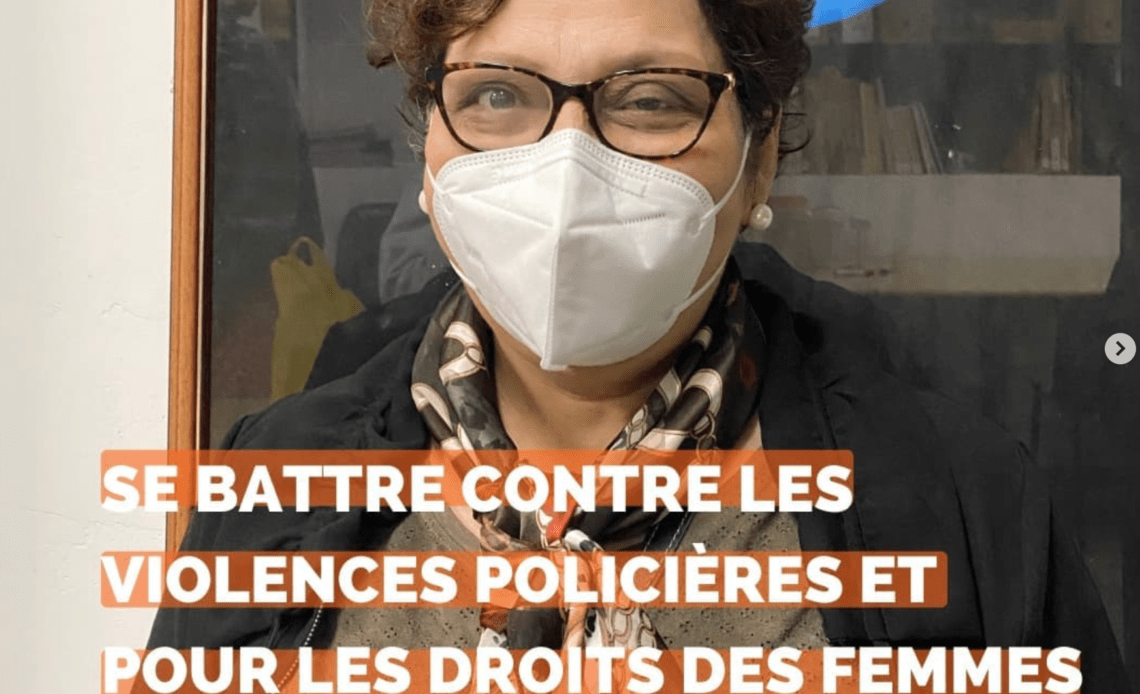
Portrait
🇫🇷 (👉 English bellow ) Patricia a aujourd’hui 60 ans et a été toute sa vie une militante pour les droits humains et en faveur de la démocratie au Brésil. Il s’agit pour nous d’un entretien très spécial, car Patricia n’est pas sortie de chez elle pour un entretien depuis le début de la pandémie. Elle a perdu de nombreux proches mais, pour nous, elle fait une exception car elle juge que notre travail est primordial.
Dès son adolescence, sous la dictature, Patricia colle de nombreuses affiches qui prônent des actions radicales contre le pouvoir militaire. Il s’agissait de dénoncer les kidnappings, les disparitions et les tortures, jusqu’au rétablissement de la démocratie en 1985. En 1993, elle dénonce les violences policières à l’égard des plus pauvres et appelle de nombreux leaders religieux à faire de même. D’après elle, la démocratie est plus que jamais menacée par le régime de Jair Bolsonaro aujourd’hui. Porter le masque est, selon elle, un acte politique, à l’heure où leur président nie encore les effets de la pandémie sur sa population.
Juive d’origine sépharade, Patricia engage sa communauté à se mobiliser pour lutter contre les violences, de mouvements néo-pentecôtistes notamment, faites à l’encontre des populations pratiquant le Candomblé et l’Umbanda. Elle participe chaque année à la marche pour la liberté religieuse pour cette raison.
Très active dans des mouvements de femmes juives, Patricia affirme avec vigueur que :
”La misogynie a été construite pendant des siècles passant par l’Europe, par les pays arabes. La participation des femmes dans les rituels religieux a été empêchée par cette Histoire.”
Pour rassembler les femmes juives et musulmanes, elle participe à l’association Peace On the Table. Pour son travail féministe, elle a reçu un prix de la Commission de défense des droits de la Femme de l’Assemblée législative de Rio. Patricia nous a marquées par son engagement dans toutes les sphères des droits humains au Brésil. Elle démontre ainsi que la paix n’est pas juste un temps entre deux guerres, mais un idéal de justice à atteindre.
Son action
Le 23 juillet 1993, des policiers brésiliens tirent à bout portant sur 50 enfants des rues au Brésil. Le “massacre de Candelaria” est alors symptomatique d’une violence systémique “contre les pauvres, les Noirs, les personnes en situation précaires” nous déclare avec puissance Patricia. Cette année-là, 4000 enfants sont mort·es sous le feu des policiers.
Alors, Patricia participe avec d’autres militant·es au mouvement “Candelaria, plus jamais” @movimentocandelaria afin qu’un tel massacre ne se reproduise plus. Après une messe dans l’église de Candelaria, elle appelle tous les leaders religieux brésiliens, de plusieurs religions, chrétiens, protestants, musulmans, candomblé, umbandistes ou bouddhistes à dénoncer ces violences. Chaque année, le 23 juillet, elles et ils commémorent ensemble cet évènement.
—–
Fighting against police violence and for women’s rights in Brazil – Patricia de Peace on the table
Portrait
Patricia is now 60 years old and has been an activist for human rights and democracy in Brazil all her life. This is a very special interview for us, as Patricia has not left her home for an interview since the pandemic began. She has lost many people close to her, but she is making an exception for us because she believes that our work is important.
Since her adolescence, during the dictatorship, Patricia has put up many posters advocating radical actions against the military power. It was to denounce kidnappings, disappearances and torture, until the restoration of democracy in 1985. In 1993, she denounced police violence against the poorest people and called on many religious leaders to do the same. According to her, democracy is more than ever threatened by the regime of Jair Bolsonaro today. Wearing the mask is, she says, a political act, at a time when their president still denies the effects of the pandemic on his population.
Jewish of Sephardic origin, Patricia commits her community to mobilize against the violence, especially from neo-pentecostal movements, against the populations practicing Candomblé and Umbanda. She participates every year in the march for religious freedom for this reason.
Very active in Jewish women’s movements, Patricia affirms with vigor that: “Misogyny has been constructed for centuries by Europe, by the Arab countries. The participation of women in religious rituals has been prevented by this history. To bring together Jewish and Muslim women, she participates in the association Peace On the Table. For her feminist work, she received an award from the Commission for the Defense of Women’s Rights of the Legislative Assembly of Rio.
Patricia has marked us with her commitment to all spheres of human rights in Brazil. She demonstrates that peace is not just a time between two wars, but an ideal of justice to achieve.
Her action
On July 23, 1993, Brazilian police officers shot 50 street children at point blank range in Brazil. The “Candelaria massacre” was symptomatic of a systemic violence “against the poor, the blacks, the people in precarious situations” Patricia declares with power. That year, 4000 children died under police fire.
So, Patricia participates with other activists in the movement “Candelaria, never again” @movimentocandelaria so that such a massacre does not happen again. After a mass in the church of Candelaria, she calls all the Brazilian religious leaders, of several religions, Christians, Protestants, Muslims, Candomblé, Umbandists or Buddhists to denounce this violence. Every year, on July 23, they commemorate this event together.
.

